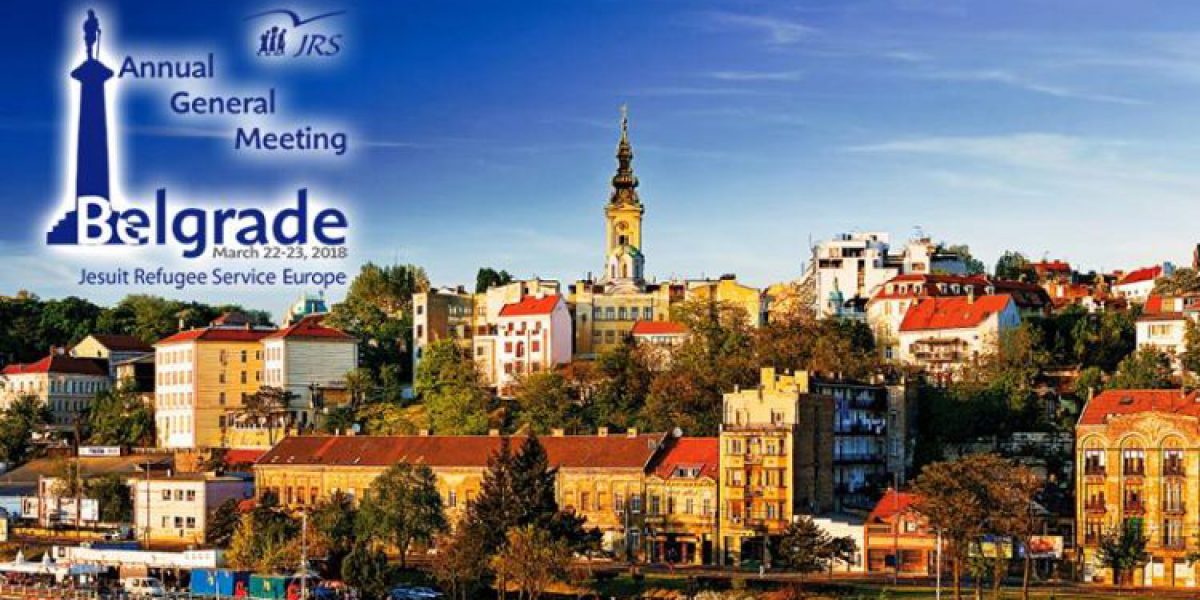Annual General Meeting, Belgrade: the challenge of welcoming and protecting refugees in a ‘transit’ country
29 March 2018

Brussels, 28 March 2018 – More than 50 members of staff from over 18 different countries gathered in Belgrade last week for JRS Europe’s Annual General Meeting (AGM). "The AGM is an important occasion for exchange on how each national office accompanies, serves and advocates for refugees," says Jose Ignacio Garcia SJ, director of JRS Europe, "And to learn more about what it means to accompany asylum seekers in Serbia, a country on the doorstep of the European Union, where forced migrants feel ‘in transit’ even if they end up staying for increasingly longer amount of time."
The first day of exchanges included a discussion with Tvrtko Barun SJ, director of JRS South East Europe, Marija Vraneševic, from Philanthropy – a charitable organisation of the Orthodox Church, and Milenko Nikic, a representative of the Serbian government. The speakers highlighted in the discussion how the situation in Serbia, and the broader Western Balkan region, changed before and after the EU-Turkey deal and the closure of the so-called ‘Balkan route’ bringing fresh challenges for the present day context. On the second day, Marko Štambuk from the Belgrade Centre for Human Rights and Jovana Gašic, from the Psychosocial Innovation Network, presented facts about the Serbian asylum system and research findings on the effect of trauma that people experience throughout their migration journeys – in home countries, on the route to Europe and upon arriving in Serbia. Similarly, to the theme of the AGM, the research focused on the psychological impacts of being ‘in transit’ for a prolonged period.
Several of the speakers stressed that Serbia kept its borders open in 2015, when many forced migrants crossed the country to seek protection in Western Europe. This is remarkable, as the country was not prepared to receive such numbers. Despite the difficult economic situation of the country, the government considered this the right thing to do, bearing in mind the recent history of conflict and forced displacement in the region. As Vraneševic said, “Everyone in Serbia has either been a refugee or has a refugee among their family or friends.”
Despite efforts that are still being made by the local authorities, helping people transiting through the Serbian territory is not the same as providing them with durable protection and integration possibilities. As the Serbian border with Croatia and Hungary is virtually closed, people are staying in Serbia for an increasingly long time without any possibility or perspective to leave. It seems that this reality is also not met by corresponding efforts from the authorities to encourage people to settle in the country. The absence of a long-term reception policy is demonstrated by the fact that asylum seekers are still accommodated in reception facilities meant as temporary accommodation, such as the Krnjaca Asylum Centre near Belgrade that AGM participants visited. Policy gaps in reception are also shown by the lack of adapted accommodation facilities for unaccompanied children, and so the government relies on initiatives such as the Pedro Arrupe House run by JRS Serbia.
While it is true that the Serbian authorities must take responsibility for welcoming refugees, it is also important to underline the role, or rather the absence of action, of the European Union. The EU closes its borders and externalises responsibilities to countries such as Serbia that struggle to properly protect them. This has unmeasurable cost for the people concerned, as they may never fully recover from their trauma and society as a whole misses the chance of benefiting from refugees’ contributions. “As far as JRS is concerned,” concludes Garcia, “What we saw and heard during this AGM made us even more aware of the importance of our work in advocating for change and gave us renewed motivation to do it by serving and accompanying refugees.”
What we saw and heard during this AGM made us even more aware of the importance of our work in advocating for change and gave us renewed motivation to do it by serving and accompanying refugees.
